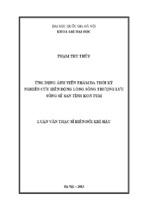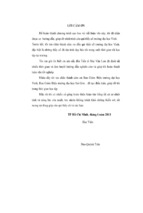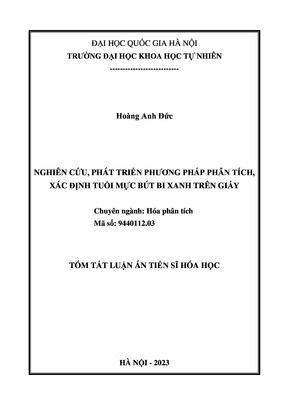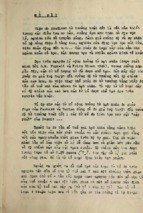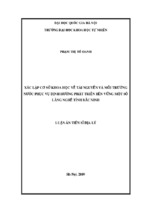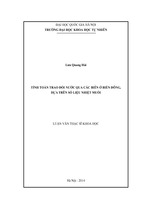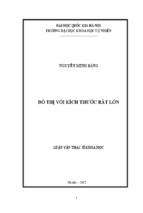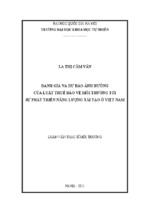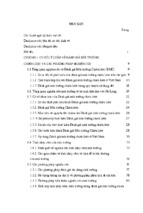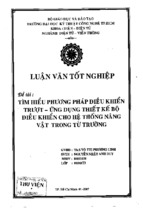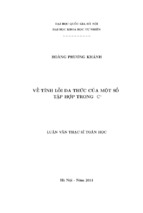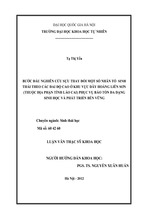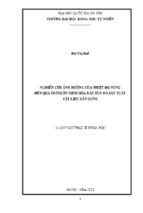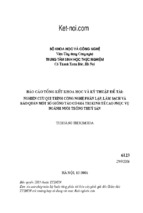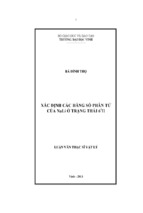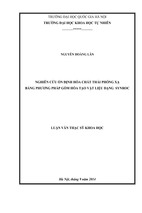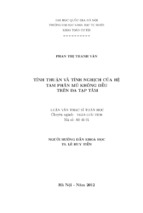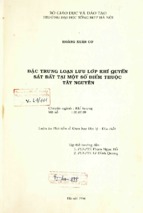ĐẠI HỌC QUỐC GIA HÀ NỘI
KHOA QUẢN TRỊ VÀ KINH DOANH
---------------------
VŨ THỊ KIM OANH
THE ROLE OF LEADERSHIP IN KNOWLEDGE SHARING OF THE
UNIVERSITY TEACHERS:
A CASE STUDY AT THE NGUYEN TRAI UNIVERSITY
VAI TRÒ CỦA SỰ LÃNH ĐẠO TRONG CHIA SẺ TRI THỨC
CỦA CÁC GIẢNG VIÊN ĐẠI HỌC:
TRƯỜNG HỢP NGHIÊN CỨU TẠI ĐẠI HỌC NGUYỄN TRÃI
LUẬN VĂN THẠC SĨ QUẢN TRỊ KINH DOANH
Hà Nội - 2017
ĐẠI HỌC QUỐC GIA HÀ NỘI
KHOA QUẢN TRỊ VÀ KINH DOANH
---------------------
VŨ THỊ KIM OANH
THE ROLE OF LEADERSHIP IN KNOWLEDGE SHARING OF THE
UNIVERSITY TEACHERS:
A CASE STUDY AT THE NGUYEN TRAI UNIVERSITY
VAI TRÒ CỦA SỰ LÃNH ĐẠO TRONG CHIA SẺ TRI THỨC
CỦA CÁC GIẢNG VIÊN ĐẠI HỌC:
TRƯỜNG HỢP NGHIÊN CỨU TẠI ĐẠI HỌC NGUYỄN TRÃI
Chuyên ngành: Quản trị kinh doanh
Mã số: 60 34 01 02
LUẬN VĂN THẠC SĨ QUẢN TRỊ KINH DOANH
NGƯỜI HƯỚNG DẪN KHOA HỌC: PGS.TS. NGUYỄN NGỌC THẮNG
Hà Nội - 2017
DECLARATION
The author confirms that the research outcome in the thesis is the result of
author’s independent work during study and research period and it is not yet published in
other’s research and article.
The other’s research result and documentation (extraction, table, figure,
formula,and other document) used in the thesis are cited properly and the permission (if
required) is given.
The author is responsible in front of the Thesis Assessment Committee, Hanoi
School of Business and Management, and the laws for above-mentioned declaration.
Date: April, 20, 2017
i
ACKNOWLEDGEMENT
I have gained huge knowledge, skill and insights from my MBA course. The course
raises my capacity of administration and management up to the next level. I am now very
confident in my position of management. I would like to extend my sincerest thanks and
appreciation to all those who have made this Thesis to be possible.
I woud like to express my great gratitude to my supervisor Nguyen Ngoc Thang for
his useful comments, remarks and engagement during my process of doing this master
thesis. Also, tôi cũng xin chân thành cảm ơn các đồng nghiệp, lãnh đạo trường đại học
Nguyễn Trãi, đã hỗ trợ trong việc cung cấp thông tin, số liệu, cũng như trả lời các câu hỏi
khảo sát được đưa ra trong nghiên cứu, để tôi có thể hoàn thiện được nghiên cứu của mình.
Sincere thanks are extended to the Faculty of International Training - Vietnam National
University, Hanoi for equipping me with huge knowledge and skills through various interesting
and practical subjects. I also would like to thanks my classmates for their friendship and
reciprocal encouragement to make our class time to be unforgettable time
Lastly, I would like to give my great thanks to my husband, my kids, and my family
who always standby me during the past two years and encourages me to keep moving from
the beginning of my study.
ii
The role of leadership in knowledge sharing of the university teachers:
A case study at the Nguyen Trai University
1. Summary of the results
In the educational environment, the issue of knowledge sharing is extremely
important and has practical implications for the addition of professional knowledge,
practical knowledge, enhancing teaching capacity and the quality of lecturers. Therefore,
the NUT also pay attentision on the sharing knowledge among faculty by organizing
seminars and science activities at the school.
However, due to not more concern the importance of the role of the leadership in
knowledge sharing activities, the results of the knowledge sharing activities at NUT are
still limited. Thus, the author studies the role of leadership in knowledge sharing at NUT.
To carry out this study, the author has systematized the theoretical foundation for
knowledge sharing, factors that affect knowledge sharing, and choice of research models.
From that, based on the results of the survey, analyze the status of knowledge sharing and
clarify the impact of factors on knowledge sharing at the NUT.
The results show that the factors of Trust in leader; Leader – follwer relationship and
Leaders behavior have positive effect on knowledge sharing. Based on this analysis, the
author proposes a group of solutions to enhance knowledge sharing in NUT in the future.
2. Applicability in practice
With the results of the study, from the assessment of the situation and proposed
solution based on regression results, combined with the opinions of the lecturers, NUT’s
leaders, the author believes that, if the solutions are synchronized implemented, it will
contribute significantly to improving the efficiency of knowledge sharing among the
lecturers of the NUT.
3. Further research orientations
Research will be improved further if additional factors can be added to knowledge sharing
(such as factors belong to the lectuers, management policies, etc.). Therefore, the direction of the
next study needs to explore more factors to make more detailed conclusions.
At the same time, I would like to express my sincere thanks to my colleagues and
leaders of Nguyen Trai University for providing me information, documents, surveys and
suggestions to help me complete this research.
iii
TABLE OF CONTENT
DECLARATION ...............................................................................................................................i
ACKNOWLEDGEMENT............................................................................................................... ii
TABLE OF CONTENT .................................................................................................................. iv
LIST OF TABLES ......................................................................................................................... vii
LIST OF FIRGURES .................................................................................................................... viii
INTRODUCTION.............................................................................................................................1
CHAPTER 1: THEORICAL FRAMEWORK AND ASSESSMENT MODEL OF THE
ROLE OF LEADERSHIP ON THE KNOWLEDGE SHARING ............................................. 11
1.1 The knowledge definition ......................................................................................... 11
1.2 The definition of knowledge sharing ........................................................................ 12
1.3 Factors affecting knowledge sharing ........................................................................ 13
1.3.1 Belief ............................................................................................................... 13
1.3.2 Communication ............................................................................................... 13
1.3.3 Leadership ....................................................................................................... 14
1.3.4 Cohesion.......................................................................................................... 14
1.3.5 Reward and incentive system .......................................................................... 15
1.3.6 Information technology ................................................................................... 15
1.4 The concept of leadership and the expression of the leadership ............................... 16
1.4.1 Concept ........................................................................................................... 16
1.4.2 Expression of leadership ................................................................................. 16
1.5 The role of leadership in knowledge sharing ............................................................ 17
1.6 Some empirical research model ................................................................................ 18
1.6.1 The Billy Whisnant & Odai Khasawneh (2014) model .................................. 18
1.6.2 The Mansor và Kenny model (2013) .............................................................. 19
1.6.3 The Phuong, T.T.L and Thuy, N.N (2011) Model .......................................... 21
1.6.4 Research model of Pham Anh Tuan (2013) .................................................... 22
1.6.5 Research model of Lin .................................................................................... 23
1.7 Proposed research model........................................................................................... 24
1.8 Technical quantitative analysis ................................................................................. 26
1.8.1 Adjustment and test the fit .............................................................................. 26
iv
1.8.2 Regression analysis ......................................................................................... 27
CHAPTER 2: CURRENT STATUS OF ROLE OF LEADERSHIP IN KNOWLEDGE
SHARING OF TEACHERS AT NGUYEN TRAI UNIVERSITY........................................... 28
2.1 Overview of Nguyen Trai University ....................................................................... 28
2.1.1 History and development ................................................................................ 28
2.1.2 Structure and cultural characteristics .............................................................. 29
2.1.3 Scale of training and the quality of training these years ................................. 31
2.1.4 Characteristics of the leadership and lecturers of the university .................... 36
2.2 The role of the leadership to share knowledge in the lecturers of Nguyen Trai
University ........................................................................................................................ 37
2.2.1 Design scales ................................................................................................... 37
2.2.2 Adjustment and test the suitability of the scale............................................... 38
2.2.3 Some basic statistics ....................................................................................... 43
2.2.4 OLS regression analysis .................................................................................. 52
2.2.5 Hypothesis test and the meaning ..................................................................... 53
2.3 Group of promoting and inhibiting factors to the role of leaders to the knowledge
sharing of the lecturers in the Nguyen Trai University ................................................... 54
2.3.1 The promoting factors and causes ................................................................... 54
2.3.2 The inhibiting factors and causes .................................................................... 55
CHAPTER 3: SOLUTION TO PROMOTE KNOWLEDGE SHARING OF THE
TEACHERS AT NGUYEN TRAI UNIVERSITY ..................................................................... 57
3.1 Declaration of mission, vision and development orientations of Nguyen Trai
University ........................................................................................................................ 57
3.2 Solutions to promote knowledge sharing among the lecturers of Nguyen Trai
University. ....................................................................................................................... 58
3.2.1 The basis for the proposed solution ................................................................ 58
3.2.2 Solutions for enhancing the role of the leader in the knowledge sharing ....... 60
3.3 Recommendations ..................................................................................................... 65
3.3.1 Recommendation to the Government and Ministry of Education and Training.... 65
3.3.2 Recommendation for the BOD of the NTU .................................................... 65
CONCLUSIONS, CONTRIBUTIONS AND LIMITATIONS OF RESEARCH .................... 66
REFERENCES ............................................................................................................................... 68
v
ANNEX........................................................................................................................................... 70
Annex 01: Questionnaire................................................................................................. 70
Annex 02: Code .............................................................................................................. 76
Annex 03: Survey results ................................................................................................ 77
vi
LIST OF TABLES
Table 2.1 Scale of the training ..................................................................................................... 32
Table 2.2 Code and study scales content................................................................................... 37
Table 2.3 Test the realiability of the scales on factor "Trust in Leaders" .............................. 39
Table 2.4 Test the realiability of the scales on factor "Leader - Follower relationship" ..... 39
Table 2.5 Test the realiability of the scales on factor "Leader behavior" .............................. 40
Table 2.6 Test the realiability of the scales on factor " Knowledge sharing " ...................... 40
Table 2.7 Test on factor " Independent variables" .................................................................... 41
Table 2.8 Matrix rotation of independent variables .................................................................. 41
Table 2.9 Test on factor " Dependent variables"....................................................................... 42
Table 2.10 Matrix rotation of "dependent variables" .............................................................. 43
Table 2.11 Statistics on characteristics of respondents ............................................................ 43
Table 2.12 Evaluation of " Trust in Leaders" ........................................................................... 46
Table 2.13 Evaluation of Leader - Follower relationship ........................................................ 48
Table 2.14 Evaluation of Leader Behavior ................................................................................ 49
Table 2.15 Evaluation of knowledge sharing activities............................................................ 51
Table 2.16 Parameter regression model ..................................................................................... 52
Table 2.17 Variance testing of the model .................................................................................. 52
Table 2.18 Regression coefficient ............................................................................................... 53
Table 3.1 Basis for the proposed solution .................................................................................. 58
vii
LIST OF FIRGURES
Firgure 1.1: Theoretical model of knowledge sharing ............................................................. 19
Figure 2.2: The Mansor and Kenny model ................................................................................ 21
Figure 2.3: The Phuong, T.T.L and Thuy, N.N model ............................................................. 22
Figure 2.4: The Pham A, T model ............................................................................................... 23
Figure 2.5: The Lin model............................................................................................................ 24
Figure 2.6: The proposed research model .................................................................................. 26
Digram 2.1 Organizational Structure of Nguyen Trai University .......................................... 29
Chart 2.1 Areas of NTU ............................................................................................................... 34
Chart 2.2 Application oriented model ........................................................................................ 34
Chart 2.3 Graduation rate ............................................................................................................. 35
viii
INTRODUCTION
1. Rationale
The 21st century, after the era of information technology, human has entered the era
of innovation thinking and knowledged economy . Today, it is quite simple if someone
wants to learn about a specific field or certain information. However, receiving
information, and making that information, skill... to become their own knowledge is not
easy matter as the Enter button on the Google search. It is natural hat, it depends on the
capacity of the learners ( on every levels) and skills, sharing conditions of the teachers ( in
all fields) ...in which, the sharing of knowledge is the key.
"In recent years, the important role of the factors to receive and share knowledge
with others in organizations, businesses and the whole of modern society is acknowledged
by many researchers"1. Obviously that, for an organization with a high level of knowledge,
such as universities, research institutes, educational institutions ... knowledge sharing is
even much more important. In the higher educational environment, quality of education is
always the decisive factor of success, reputation and development. In this regard, the
educational managers and scientific researchers have acknowledged the role of strategic
vision, infrastructure, platform trainers ... and especially knowledge sharing. The sharing
of knowledge is not only the viewing angle from the faculty to the students but also to
other teaching staffs in the faculty together, in which, the role of leadership is highly
valued in this process2.
So how to process knowledge sharing effectively, what factors affect the
knowledge sharing? That is a question that many scientific researchers and educational
administrators in the world try to find the answers. However, with each different object, in
different conditions and at different stages, the answers also have many interesting
differences.
In the current status of education in Viet Nam, the stable development and
existence in the severe competitive environment of the universities depend heavily on the
level of knowledge using in the organizations. Many previous studies show that, the
knowledge management system totally depends on technical features (information
technology, infrastructure, supported equipments...) without concerned to other important
1
Quote part in the study of PGS. Dr. Nguyen Van Thang. Managing Director of Institute of Asia - Pacific, National Economics
University.
2
Lu, L., Leung, K., and Koch, P.T (2006). Managerial Knowledge Sharing. The role of individual, interpersonal and organizational
factors. Managemetn and Organization Review, 2(1), 15-41.
1
factors. The modern knowledge management model absolutely needs the cooperation of
staffs and opening environment of knowledge discussion and sharing, especially in
universities. In addition, the role of incentive regulations and leadership are major factors
that would help promoting the knowledge sharing. Knowledge sharing just be the best
effective in the case of strictly relation to the organization and be encouraged to develop.
Therefore, knowledge sharing is very important for the universities. Because, though many
teachers (lecturers) have professional skills, rich of experiences of teaching content,
teaching methods should be encouraging them to share for young teachers, quickly
improvement the qualification level and skills, access to knowledges and experiences of
the older generation. In addition, updating new knowledge and sharing knowledge within
teachers is neccesary to create a dynamic higher educational environment.
At Nguyen Trai University - an young profession - oriented higher education
university, improving the quality of education, qualifications, knowledge of the lecturers
(teachers-in general) is a top priority task in the University's development. To do this,
teachers must implement effectively knowledge sharing among high - qualified lecturers
with teaching staffs nearby. Because, with uneven team qualifications (teaching
experiences, knowledges and professional skills ...), when the process of sharing
knowledge between teachers effectively takes place, the quality of the teaching staff will
be enhanced. And from there, the quality of education will soon achieve such statement by
the Chairman of the Board "...the biggest dream of my life is to help students succeed
faster than their teachers"3
In recently years, at the Nguyen Trai University, there was lack of seminars,
conferences, discussions to sharing knowledge. This actual status is very worried situation
that needs to be more consideration of all the lecturers, department leaders and university
manager board. To solve this current status, the manager board of the Nguyen Trai
university specially needs critical evaluation informations, of which the role and impact of
leadership factor is the most concerned. Since then, the search for solutions to promote the
knowledge sharing activities on a regular basis, more effective and step by step to set up it
as a specific culture of the Nguyen Trai university.
Hence, finding out the factors that influence the process of knowledge sharing in the
teaching staffs of the university will help somewhat to raise the level of teaching staffs and
3
Message from Chairman of the Management Board and mission announcement of NTU
2
support the development of the Nguyen Trai university. Therefore, the author select the
research title of "The role of leadership in knowledge sharing of the university teachers:
A case study at the Nguyen Trai University" to fulfillment the master thesis
2. Literature review
Contents of research on knowledge sharing and knowledge creation is an array of
research is quite new in the world since the term "age of information technology" was
gradually replaced by the term "time era of knowledge economy. " However, the studies
were carried out in recent years are extremely rich and become a source of qualified
references for researchers, managers are interested in this field. It can be classified
according to the following directions:
2.1 Foundation research
Among the research platform, Nonaka is regarded as the "father" of the theory and
practice of innovation and knowledge sharing. In his classic work 4, Nonaka establish a
model of knowledge creation process, which is based on that, a series of experimental
studies later inherit. The process of knowledge creation of Nonaka be summarized into
four stages are:
Social communication (Socialization)
Externalization process (Externalization)
The process of combining (Conbination)
The process of internalizing (Internationalization)
Basically, Nonaka has designed innovative model called SECI as the above. The
results of this study are inherited thoroughly (and almost entirely) in future research. It is a
particularly point that, in this model the role of leadership is recognized of in every
knowledge creation process (as well as sharing knowledge - a step in the creation of
knowledge)5.
2.2 The theoretical research and model of knowledge sharing assessment
In this section, the author does not summarize all the theoretical researches have
been done before. This section is totally inherited from an essay of Seng Wang (2010). In
this study, Seng Wang summed over 76 studies published since 1998 to 2010. The studies
4
5
This work has been quoted on international magazines ISSN by more than 6000 other researchers
See details in Nguyen Van Thang. Nonaka's creative theory and applications in public organizations in Vietnam.
Institute of Southeast Asian Studies. National Economics University. 2014.
3
were designed both by qualitative and quantitative methods to show the basic factors
affecting knowledge sharing include:
• Group Organizational
factors include:
organizational
culture, structure,
environment, perspective and style of management, rewards and incentives, facilities ...)
• Factors in a team: including team characteristics, diversification, social relations
• Factors of the culture
• Factors of the individual
• Groups of motivation factors: trust, benefits received, the attitude ...
The results summarized in the study by Seng Wang will be radically inherited in
proposing the scale, adjust the scale, factor analysis ... in surveys and regression of the
author in this study.
2.3 Some typical quantitative research related intimately
In 2015, the authors Abdur-Rafiu, M. A and Opesade, A. O (2015) performed a study
titled " Knowledge Sharing Behaviour of Academics in The Polytechnic Ibadan". This
study conducted on a sample size of 235 teachers (scholars) of 5 different faculties of the
Polytechnic Ibadan, based on behavioral theory (TPB-theory of planned behaviour). The
study results showed that, the scholars of the Polytechnic Ibadan willing to share
knowledge if both groups of factors promoting and hindering (inhibiting) are adequately
addressed. While behavioral and commitment is statistically to knowledge sharing, the
variable attitudes, beliefs, and the contents are non-statistically significant.
However, limitations of this study is that the methods just is basic statistical. This
simple method may lead to biassed conclusion because regression analysis and correlation
analysis on the modern regression model are not applied.
A similar study was conducted by Goh See Kwong (2013) in Malaysia. The author
has done a research with the title "Knowledge sharing among Malaysian academics:
Influence of affective commitment and trust". The research was done with the sample of
545 frequencies that belong to 30 different universities across Malaysia. Research models
are also designed based on the theory of behavior (TPB). This study is more
comprehensive than study by Abdur-Rafiu, M. A and Opesade, A. O. That cited a the
regression model with high reliability technic. At the same time, the conclusion of this
study is completely different with Abdur-Rafiu study, M. A and Opesade, A. O when
author Goh See Kwong confirmed positive impact of the beliefs to knowledge sharing
4
intentions. Additionally, authors reach a conclusion also extremely meaningful. That is,
scholars (lecturers) at private schools willing to share knowledge fewer than scholars in the
public schools. This conclusion is an interesting indication of future studies in my thesis.
Because, if this conclusion is true with university Nguyen Trai (knowledge sharing
expectation in the Nguyen Trai University is low), then the University will have to do a lot
of solutions to promote this activity further.
However, this study has some given limitations at the research data (as the authors
have pointed out). That is, the authors used only the data at a time of the respondents on
the whole territory of Malaysia (cross sectional data) but not verifiable relationships based
on time series data research.
A study of the authors Islam, Z. M, Hasan I, Ahmed, S. U, and Ahmed, S. M (2011)
with service organizations were conducted in Bangladesh in 2011. The authors have had
many interesting conclusions such as: the system of rewards and incentives is absolutely
no sense in terms of knowledge sharing6. Conversely, factors such as trust, connection
between the staff and the role of leadership positively affect (positively) to share
knowledge. Conclusion of this research is quite unexpected. However, it may be one of the
study's limitations. In fact, the authors conducted a survey with questionnaires to a large
number of middle-level managers and senior (129 frequencies sample are satisfactory).
This can be explained by differences in the conditions of individual knowledge sharing.
The senior managers (high-income) who have better social status of other employees.
According to Maslow's theory of needs, they obviously need social interaction and
connection (rather than physical needs, financial needs). And therefore, reward or incentive
would not the engine to share their knowledge. On the other hand, the research model of
the authors performed only with 4 variables (4 fators) and therefore, there can be a lack of
explanatory variables (and affected to the conclusions).
In Vietnam, Dr. Nguyen Van Thang (2014) is regarded as one of the leading
researchers in this field. In his study entitled "Theory of Knowledge Creation of Nonaka
and applications in public organizations in Vietnam", the author has come to the
conclusion: The sharing of knowledge has a direct impact on results of work of the staff in
the public units in Vietnam. In addition, the author Nguyen Van Thang said that the
opportunity to experience the new job and formalize the instructor assignment of new staff
6
This is one of the few researchers concluded no effect.
5
will increase knowledge sharing within the organization. These conclusions are the basis
for the expectation that, if finding out the specific impacts of the role of leadership in
knowledge sharing at the University of Nguyen Trai, one may propose effective solutions
for promoting knowledge sharing and improve the quality of education at the university, in
general.
In a study from 2007, the author Lin, H.F proposed a fairly simple and efficiency
model in the evaluation intent to sharing knowledge. In the model of Lin, the author only 3
factors proposed include: enjoy helping others, self-efficiency knowledge and support of
senior managers, in which factors enjoy helping others has the greatest impact. This
suggests that a friendly working environment and equality will be a prerequisite for
knowledge sharing within the organization.
Thus, there are many theoretical and practical researches on the content of
knowledge sharing within the organization have been made in Vietnam and around the
world. However, as most authors state, in each a different period, different organizational
characteristics, different environment ... then the impact of each factor is also very
different. In particular, the leadership factor (which appears in most studies) are oftenly
mentioned as a major factor. The leadership factor is reflected in three aspects including
leadership behavior, staff - leader (leader - follower) relationship and the trust in leaders.
With Nguyen Trai University, author of this thesis assert that there unprecedented studies
have been performed with the same content. And so, with the urgency of the topic and
planned research model, the author committed to the new and different of this study (in
terms of subject research, scope, context, data, ...).
The specific contents of the model and scale will be detailed in future studies. Here
just briefly identification of the intended model:
6
Research model
In which, the variables are expected to be implemented under the survey and scales
measured by Whisnant successor, B., & Khasawneh, O. (2014) as follows:
• The behavior of the leader (Leader behavior)
+ Judiciously decision
+ Wisdom
+ Towards the organization
+ Persuasive appointment (personnel)
+ Emotion healing
• Leader-follower relationship
+ Strengthening informal conversation
+ Close relationships with employees
+ Responsibility sharing
+ Empathy together
• Trust in leaders
+ Feeling confident because the leaders will understand the problems
+ Believe in the truth of the words of leaders
+ Believe that the leaders’ decision would benefit (good for staff)
• Knowledge sharing
+ Believe that they can share the knowledge
+ The leaders will apply the knowledge that was shared in the best way
+ Trust that the leaders fully appreciate the shared knowledge
+ Feeling responsible to share knowledge
+ Ready to share knowledge, information
7
+ Ready collaborate to share knowledge, information
+ Constantly searching and mining information together
3. Research objectives
3.1 Overall objective
This study aims to determine the influence of the factors include: leader behaviour,
relationship leader-follower and trust with leaders to the knowledge sharing within
lecturers of Nguyen Trai University, as the basis for the orientation of practical solutions to
promote this activity at Nguyen Trai University.
3.2 Specific objectives
• Overview the documents to specify the expression of knowledge, and knowledge
sharing, the assessment model of knowledge sharing, the relationship between the
leadership and knowledge sharing ... and select the research model;
• Accurately assess the influence of the factors: leader behaviour, relationship of
leader-follower and trust in the leaders to the knowledge sharing within lecturers of
Nguyen Trai University, specifying the factors to promote or to limit the activity of
knowledge sharing in Nguyen Trai University.
• Propose some solutions to support knowledge sharing activities within lecturers of
Nguyen Trai University, improve the quality of teaching staffs and education quality of
Nguyen Trai University.
4. Objects of research
This research focus on the influence of the factors (selected) to the knowledge
sharing within lecturers of Nguyen Trai University.
5. Scope of research
Location: This study will be conducted at Nguyen Trai University in Hanoi
Time: This study is inplemented basing on the secondary data of Nguyen Trai
University since 2014 to 12/2016. Primary data is collected through surveys by email and
direct interviews with lecturers in April and May 2017. The survey respondents are faculty
lecturers, back - office staffs and university managers in different levels.
6. Research methodology
Three main methods are used in this study include:
• Qualitative methods: used in the research overview, orientation and scale factors,
the proposed model selection, techniques and quantitative analysis selection.
8
• Statistical method: use in analyzing the basic information about the team,
demographics, qualifications, income ... of the secondary data collected from Nguyen Trai
University. The secondary data include: information of lecturers, educational results,
konwledge sharing data of Nguyen Trai university since 2014-12/2016.
•
Quantitative Approach: the main method in this study include: design and
evaluation scale, exploring factor analysis (EFA), correlation analysis and regression
analysis, using techniques OLS-based rules, SPSS 20.0 software. The primary data is
collected through surveys by email and direct interviews lecturers, faculty managers and
university managers in April and May 2017.
Sample size:
This study using the EFA and linerity regerssion analysis, the model include 4
variables (1 dependent variable, 3 explanatory variables) with total 20 indicators. Thus, as
the principle of 5 observations per indicator, the minimum sample size is 100 observations.
In addition, in order to fit with the reserch objectives and high representative of the
sample, the sampling method is choosen as “Stratified Random Sampling method”.
Formula for sample size determination:
Sample size formula: n= {(1/N + (N-1)/N* 1/(p(1-p) * (e/ Z1 - &/2) 2 }-1
(*)
In which: n is sample size; N is population size; Z is Z distributation (at 95%
confidence interval, Z=1.96); e is random error (in general, accepted error about +/- 1%
or +/-5 %); P is probability of choosing answer (best situation is 50%); N is the
population (total lecturers and managers in Nguyen Trai university)
The “stratified” refer to groups of: (1) long-term lecturers (by age, gender,
experiences); (2) short-term lecturers; (3) visitting lecturers; (4) faculty managers; (5)
university managers.
The minimum sample size as the (*) formula at least equal to 100.
Scale: Use the Likert 5-levels scale to measure the criteria for the four variables (as
indicated above). The criteria reflecting these four factors are inherited from Lin's 2007
study; Whisnant, B., & Khasawneh, O. (2014).
7. Research structure
Thesis is structured in accordance with the following content:
FOREWORD
9
Chapter 1: Theorical framework and assessment model of the role of leadership
for knowledge sharing
Chapter 2: Current status of role of leadership in knowledge sharing of the
teachers at the Nguyen Trai University
Chapter 3: Solutions to promote knowledge sharing of the the teachers at the
Nguyen Trai University
CONCLUSIONS, CONTRIBUTIONS AND LIMITATIONS OF RESEARCH
10
- Xem thêm -


